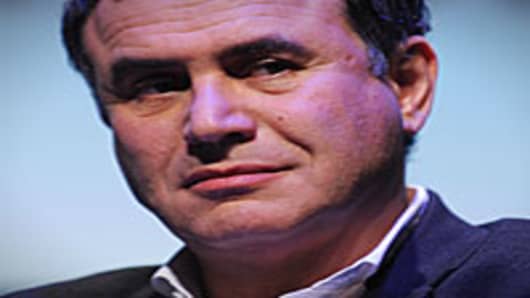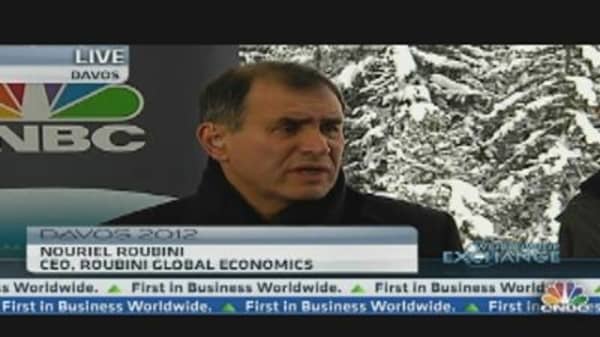Europe needs "massive monetary easing" to get out of its debt crisis, otherwise Greece will likely abandon the euro in a year and a half, famous economist Nouriel Roubini told CNBC on Wednesday.
Private creditors who lent Greece money, such as banks and investment funds, are meeting in Paris after talks on a debt swap that would change shorter maturity Greek bonds for longer maturity ones to give the country more chances to reduce its debt were inconclusive last week and earlier this week.
"Greece is going to be the first country to restructure its debt, I don't think it's going to be the last one," Roubini told CNBC in an interview at the World Economic Forum in Davos.
Without swift measures, Greece may be the first country to leave the euro zone, the economist, who has the reputation of correctly predicting the financial crisis that hit in 2007, said.
The European Central Bank needs to act swiftly with "massive monetary easing" to prevent the crisis from deepening and austerity measures must be reined in, according to Roubini, in whose opinion the euro needs to be 20 percent or even 30 percent weaker to help the euro zone economies.
"There's a severe recession in the periphery of the euro zone," he said. "Less austerity, more growth, that's what the euro zone needs today."
'No Real Decoupling'
The issue of whether or not to raise taxes in the U.S. will be an important one in the presidential election campaign as the American economy is threatened by slowing world growth and recession in parts, Roubini also said.
"There is no real decoupling… there is a recession right now in the periphery euro zone," he said.
"There's a recession throughout Europe, US growth is very anemic. There is a slowdown right now in China," Roubini added.
Data released by the UK government showed the economy contracting by a worse-than-expected 0.2 percent in the fourth quarter, bringing the country closer to a double-dip recession.
On Tuesday, the International Monetary Fund (IMF) slashed its estimates for world economic growth and warned that the euro zone debt crisis was going through a "new, perilous phase."
There are too many problems in the euro zone such as the large public debt and the current accounts of some countries, Roubini pointed out.
"These will not be solved by the ECB printing money," he said.
"These are fundamental problems that are going to take years to solve… and now the contagion has spread."




